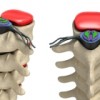Frequently Asked Questions
1. What are Intervertebral Discs?
2. How do the Spinal Discs Become Injured?
3. What are the Symptoms of a Nerve Impingement Related to Disc Compression?
4. What Conditions can Benefit from Spinal Decompression?
5. How Does Non-Surgical Spinal Disc Decompression Compare to Other Treatment Methods?
6. How does DTS Spinal Decompression Work?
7. What are Doctors saying about Spinal Decompression Therapy?
What Are “Intervertebral Discs”?
The bones of the spine called vertebrae are separated by tough cartilage pads called intervertebral (inter = “between”; vertebral = “bones of the spine”) discs.
How Do the Spinal Discs Become Injured?
Over time gravity, spinal joint dysfunction and accumulated trauma cause the discs to compress, flatten and degenerate. This constant compression prevents much-needed oxygen and nutrients from entering the disc to aid in healing and trauma recovery. This ongoing starvation causes the once-tough outer layers of the disc to soften allowing the contents of the disc to bulge outward. Significant disc damage can become a tear called a disc herniation. If the inner gelatinous material of the disc can leak out it’s called a disc sequestration. The “jelly center” of the disc can also dry out over time which is referred to as Degenerative Disc Disease. All forms of disc injury can eventually impinge on the nerves exiting the spine (“pinched nerve”) which can create numbness, tingling, burning or sharp pain down the arms or legs. Sharp pain originating from the back and “shooting” down the legs is often referred to as sciatica. The only treatment that can reverse this degenerative compression is non-surgical spinal decompression (DTS).
What Are the Symptoms of A Nerve Impingement Related to Disc Compression?
All forms of disc injury can eventually impinge on the nerves exiting the spine (“pinched nerve”) which can create numbness, tingling, burning or sharp pain down the arms or legs. Sharp pain originating from the back and “shooting” down the legs is often referred to as sciatica.
What Conditions Can Benefit from Chiropractic Care and Spinal Decompression?
You can find out more about this on our “We Can Help You With” page. The following are list of conditions that can be helped with Spinal Decompression:
- Severe or Chronic Neck Pain
- Pinched Nerves in the Neck or Low Back
- Sciatica
- Degenerative Disc Disease
- Herniated Discs (Disc Herniation)
- Bulging Discs
- Partially Ruptured Discs
- Numbness, Tingling, or Burning Pain
- Weakness of the Arms or Legs
- Sharp, Shooting Pain
- Facet Syndrome
- Some Forms of Spinal Stenosis
- Some Cases of Failed Back Surgery
How Does Non-Surgical Spinal Disc Decompression Compare to Other Treatment Methods?
There are several options a patient may consider, including:
- Spinal Decompression
- Oral and Injected Medications
- Physical Therapy
- Chiropractic Treatment
- Surgical Treatment Options for Disc Herniations and Disc Bulges
How Does DTS Spinal Decompression Work?
- Decompression techniques provide relief by separating the bones of the spine reducing the pressure within the disc (intradiscal pressure)
- Disc decompression treats the source of the pain – pain caused by disc bulge or disc herniation pressure
- Treatment is computer controlled
- More advanced methods use oscillation to reduce muscle spasm that could work against the decompression motion
- More advanced methods also direct the treatment to specific levels of the spine by varying the angle of decompression making the treatment more effective and comfortable
What are Doctors saying about Non-Surgical Spinal Decompression Therapy?
“There is a place for surgery, but defenitely not at the front line. Non-Surgical Spinal Decompression Therapy should be a front-line treatment for chronic back pain patients suffering from bulging, herniated, or degenerative disc disease, and facet syndrome.
As a surgeon, I only want to do surgery when I absolutely have to. Spinal Decompression Therapy gives my patients a more conservative treatment option that can eliminate the need for surgery altogether, and that’s a very good thing.
Spinal Decompression Therapy also gives me a treatment option for those patients who have had surgery and have a relapse or experience a return of pain following surgery. It allows me to offer patients a key, non-surgical weapon in the war on back pain.”
Bernard Zeliger DO, FACOS, FAOAO, FICS Osteopathic Physician and Surgeon Founding Dean and Provost of Touro University College of Osteopathic Medicine, Vallejo, CA
“As an interventional pain physician, I feel that Spinal Decompression Therapy has filled a void in our continuum of treatment for those patients suffering from back and neck pain associated with disc pathology. The majority of the other procedure I perform, such as injections and nerve blocks, treat the pain due to tissue and nerve irritation, which only reduce the patients’ pain. My enthusiasm for Spinal decompression Therapy stems from the fact that it it the only therapy that scientifically attempts to heal and “rejuvenate” the discs. My personal experience with this non-invasive therapy is that qualified patients will show improvement within the first few treatments.”
Juan J. Gargiulo MD -Southampton, NY East End Pain Management
“Neurologists like myself have long known that we should do everything possible to help our patients avoid back surgery. Now with Spinal decompression Therapy we finally have a very effective way to treat back pain without surgery. The vast majority of even our worst cases experience significant, long-lasting relief if they complete the entire treatment regimen. Anyone who says this is experimental doesn’t know what they’re talking about.”
Orlando Maldonado MD -Bradenton, FL
“We have treated thousands of patients who have experienced long term, pain free healing because of decompression therapy. With non-surgical decompression we offer real modification of the patient’s disc disease processes and rehabilitation of the neuropathic and mechanical symptoms, rather than just offering palliative care. I use it for myself and it is worth its weight in gold.”
Phil Fisher DO, PhD -Barboursville, WV
CALL TODAY TO SEE IF DTS SPINAL DECOMPRESSION THERAPY IS FOR YOU!
914-368-7667


